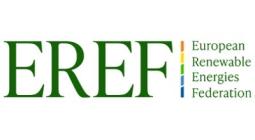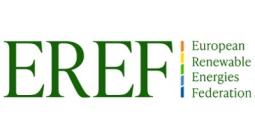EREF Press Release on the 2023 State of the Union Address by President von der Leyen
Yesterday, EU Commission President Ursula von der Leyen delivered her annual "State of the Union" address. EREF’s very much welcome her focus on the European Green Deal.
With the recent clear approval of the inter-institutional agreement on Renewable Energy Directive (RED) by the European Parliament, Ms von der Leyen can certainly claim further progress in the move towards more renewables and more climate protection.
The new RED foresees new targets for renewables of 45 % until 2030. This means a doubling of the Europe-wide share of renewable energies compared with the level of just under 22 percent in 2021. The expansion of wind and solar energy as well as cross-sectoral use will be essential.
Further key points of RED:
Cross-sectoral targets for 2030: The share of renewable energies must grow by 0.8 percentage points per sector each year and by 1.1 percentage points annually from 2026. In addition, there is a target of 49 percent renewables in heat demand in buildings. In the transport sector, the already binding target increases from 14 percent to 29 percent. 42 percent of hydrogen consumed in industry in 2030 must come from renewable energy sources.
Continuation of regulations for simplified renewables expansion: Accelerated approval procedures for the expansion of renewables and grids, which were adopted in the EU Emergency Ordinance, are largely codified. Thus, the expansion of grids and of renewable energies is in the overriding public interest and time-consuming review steps can be dispensed with in priority areas. The prerequisite is that appropriate avoidance or compensation measures have been taken and that the level of nature conservation remains high.
Promotion of cross-border projects: Each Member State is required to initiate at least one cross-border cooperation project.
No crediting of low carbon fuels to RE targets: Low carbon fuels will not be counted towards the renewable energy targets. There is still a clear distinction between green and low carbon hydrogen (especially hydrogen from nuclear energy).
Ramp-up of e-fuels in aviation: The ramp-up of e-fuels in aviation is to be promoted more strongly. This means that what has already been law in Germany since 2021 now applies at EU level - the German e-fuels quota was previously the world's first obligation to use these fuels. Across the EU, at least 1.2 percent e-fuels must now be used from 2030, and this is to be increased to 35 percent by 2050.
But back to the State of the Union: We remember: On 11 December 2019, the Commission presented a communication (COM(2019)640) on the European Green Deal that sets out a detailed vision to make Europe the first climate-neutral continent by 2050, safeguard biodiversity, establish a circular economy and eliminate pollution, while boosting the competitiveness of European industry and ensuring a just transition for the regions and
workers affected.
Only, under the green deal many legislative acts have still not been adopted. Almost two thirds of the acts and plans need to be adopted still under this legislature period. That would mean a tremendous work to achieve before the end of the year and ahead of the next elections to the European Parliament in June next year. The list of priority amendments under the Commission’s work programme 2023 and in view of the Green Deal under ANNEX III points to so-called priority pending proposals with more than 20 proposals still on its way this year.
Heavy files such as on chemicals policy and on air quality see no progress being made. In the case of the climate laws that are still open, the resistance in the European Parliament is growing, not least from within Ms. Von der Leyen’s own political group, the EPP. The battle around the nature restoration law is significant for a negative trend in the Union.
EREF is worried on the amount of pressure from a dangerous cocktail of anti-climate lobby groups, anti-Europe and anti-democracy right wingers and nuclear desperados and profiteers. Paired with some set-back under the same stress in Member states we face tough times ahead for the period after the coming elections. All at a point, when renewables and system change have again and again proven their economic and climate validity, job-creation effect, and healing power.
Crunch time in Brussels and beyond – let us push for more, for Europe and a high voter turnout- all over the Union.






